Over the last decade, a green wave has swept across the nation, legalizing cannabis in more than half of the United States. As it currently stands, 37 states have passed cannabis reform to varying degrees. Twenty one states have established adult-use cannabis programs, while sixteen states have medical-only cannabis programs.
To better understand cannabis legalization in the United States, it’s important to define what distinguishes adult-use programs from medical cannabis programs. It’s also worth knowing what cannabis decriminalization is and what it means when a state is “CBD-Only.”
State-by-State Cannabis Laws
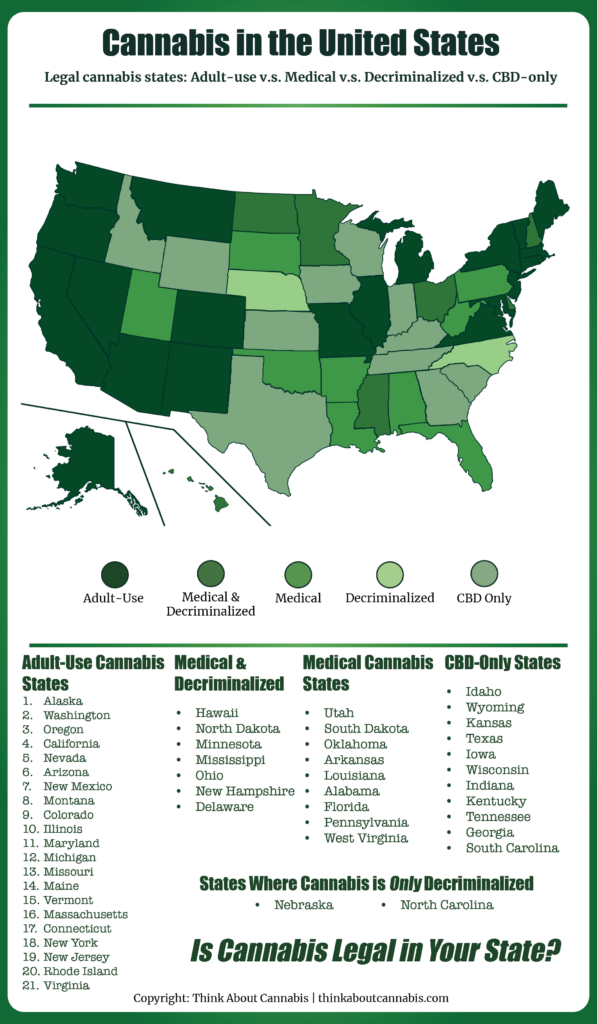
The legality of cannabis in the United States can be broken down into five different categories:
- Adult-Use: States where anyone over the age of 21 may purchase cannabis products from a dispensary. More often than not, states with adult-use cannabis programs also have medical cannabis programs.
- Medical & Decriminalized: States where qualifying patients may obtain a medical cannabis card. Although adult-use cannabis is not legal in these states, cannabis use is decriminalized.
- Medical Cannabis: States where qualifying patients may obtain a medical cannabis card to purchase products from dispensaries. Adult-use cannabis is not legal in these states, nor is cannabis decriminalized.
- CBD-Only: States where cannabis only hemp-derived CBD is legal. All other forms of cannabis are prohibited.
- Decriminalized: States where cannabis is decriminalized, but there are no established adult-use or medical cannabis programs in place. Decriminalization means individuals will face lesser legal penalties for personal possession of cannabis (i.e., a fine instead of jail time). The limits for “personal possession” may vary from state to state.
It’s also worth noting the qualifying conditions for medical cannabis vary from state to state. While some states leave it to a doctor’s discretion, others have a strict, set list of conditions patients must have to qualify for a medical cannabis card.
You can find out more about the qualifying conditions in your state by visiting its Department of Health website.
States with Adult-Use Cannabis Programs
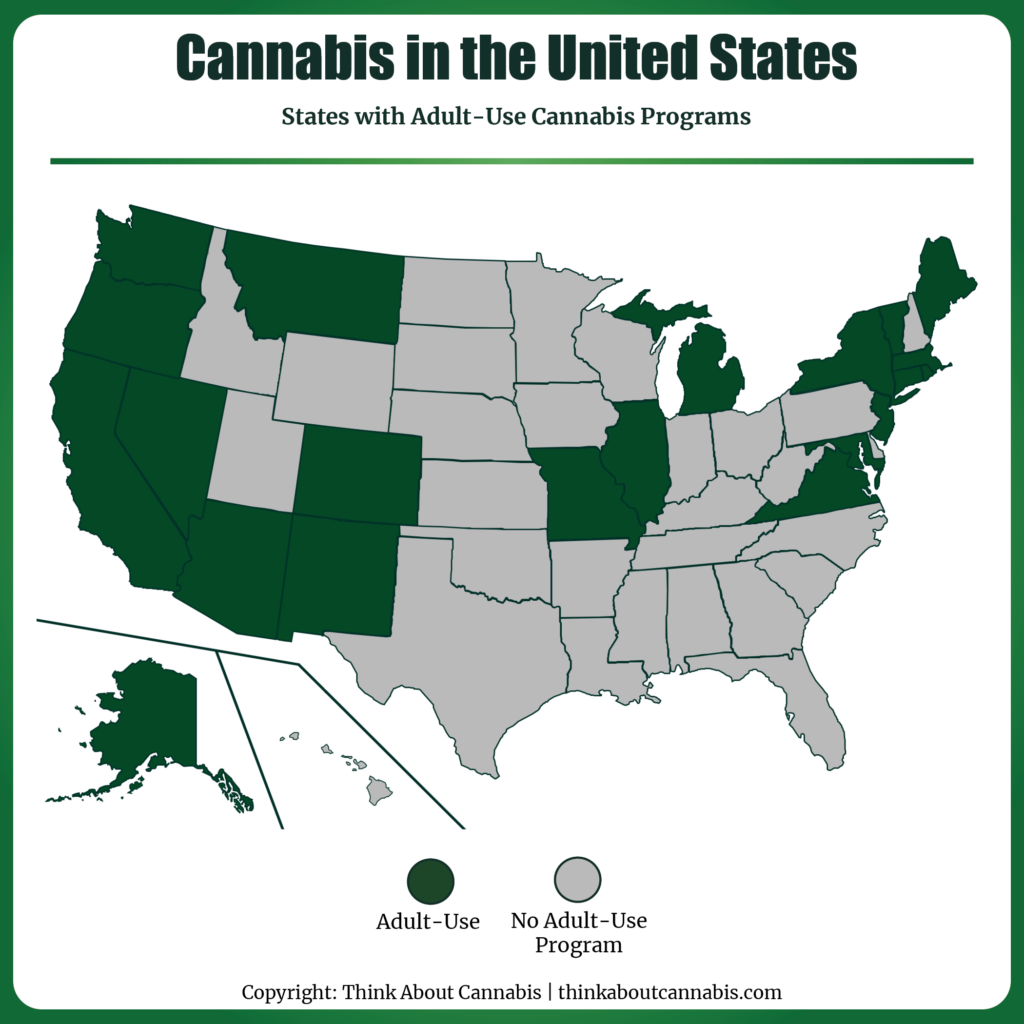
Twenty one states have officially legalized adult-use cannabis, including:
- Alaska
- Washington
- Oregon
- California
- Nevada
- Arizona
- New Mexico
- Montana
- Colorado
- Illinois
- Maryland
- Michigan
- Missouri
- Maine
- Vermont
- Massachusetts
- Connecticut
- New York
- New Jersey
- Rhode Island
- Virginia
States with adult-use programs also have medical programs. While it may seem “pointless” to have a medical cannabis program when recreational sales are fully legal, medical cannabis patients in adult-use states are entitled to certain benefits.
For example, medical cannabis is usually subject to fewer taxes and fees than recreational cannabis products. Additionally, medical cannabis is more highly-regulated, meaning it may be of better quality than recreational cannabis products. There may also be notable potency differences between the products offered at medical dispensaries v.s. adult-use dispensaries.
Adult-use and medical cannabis are also legal in Washington D.C. — but with a catch. Anyone over the age of 21 may possess 2 ounces of recreational cannabis in D.C. However, it has to be obtained through gifting — and only 1 ounce may be gifted at a time.
Since the sale of recreational cannabis is still prohibited in Washington D.C., many get around this law by selling something like a t-shirt for $50 and then giving the customer cannabis as a “free gift.”
Medical dispensaries in D.C. are permitted to sell cannabis to local patients or tourists with qualifying medical cards from other states.
Oh, and if you visit D.C., you should know that it is completely illegal to smoke on federally owned property — so don’t go lighting up a joint in front of the White House or one of the Smithsonian museums!
States with Medical-Only Cannabis Programs
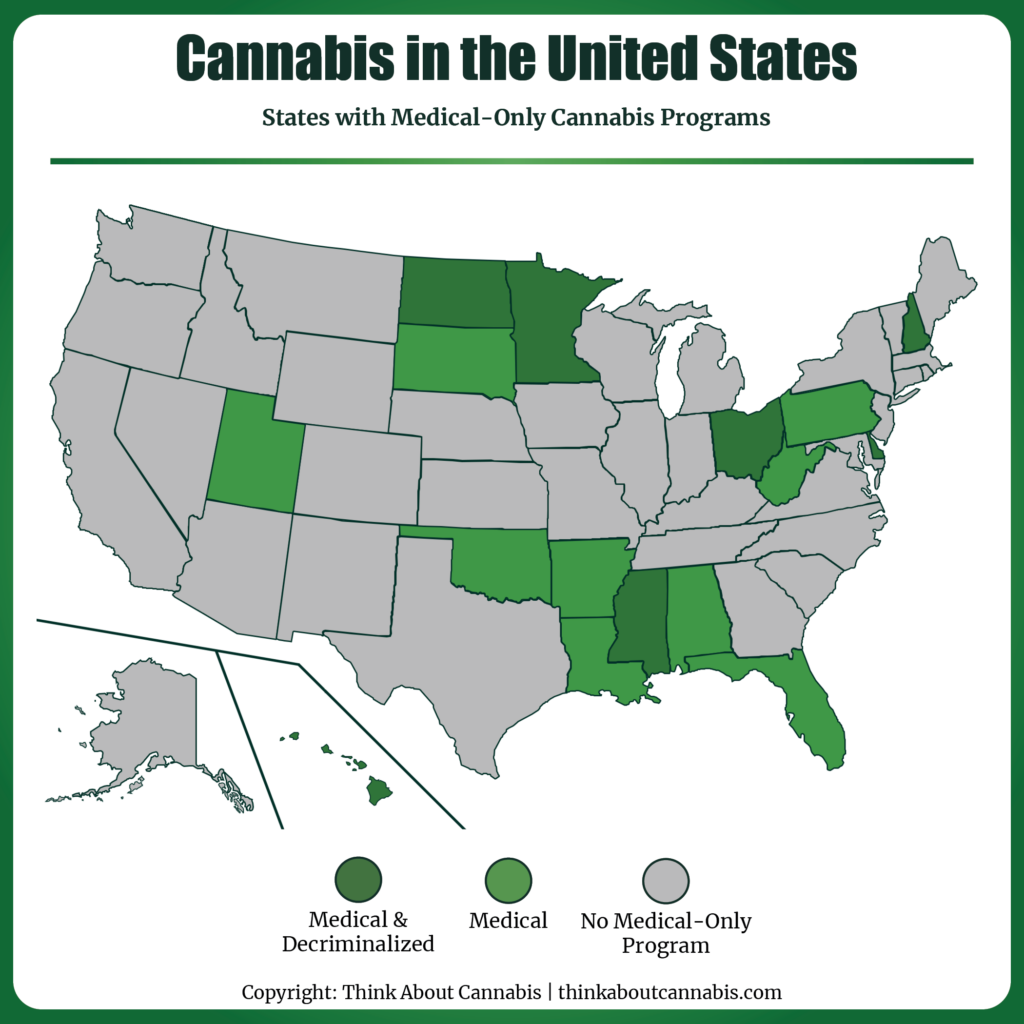
Sixteen states have established medical programs. Although non-medical cannabis use is illegal in most of these states, a handful of them have also decriminalized cannabis. The medical-only cannabis states can be broken into two categories:
Medical & Decriminalized Cannabis States:
- Hawaii
- North Dakota
- Minnesota
- Mississippi
- Ohio
- New Hampshire
- Delaware
Medical-Only Cannabis States:
- Utah
- South Dakota
- Oklahoma
- Arkansas
- Louisiana
- Alabama
- Florida
- Pennsylvania
- West Virginia
Again, the conditions that qualify patients for medical cannabis vary from state to state. You can learn more about the qualifying conditions in each state by visiting their respective Department of Health websites.
States Where Only Hemp-Derived CBD is Legal
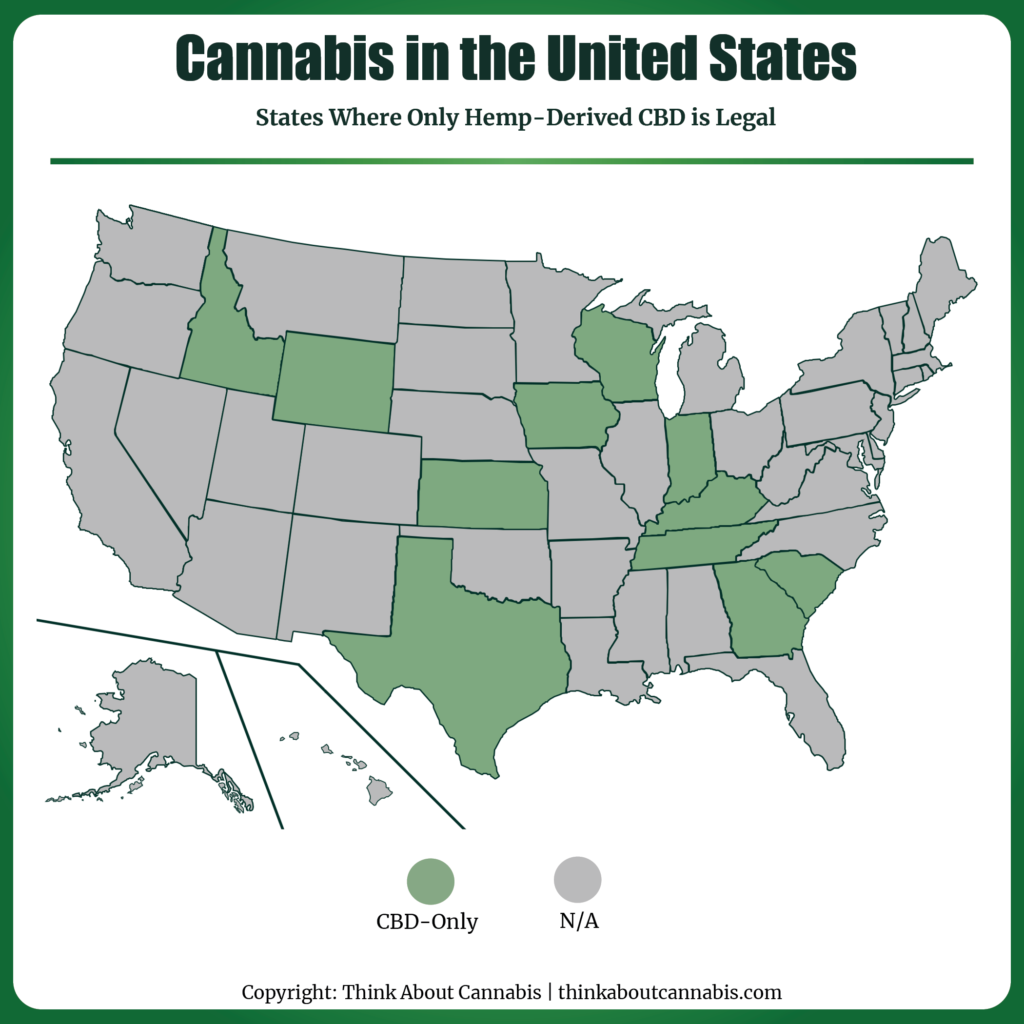
The 2018 Farm Bill federally legalized hemp-derived CBD with ≥ 0.3% THC. While some states initially pushed back and banned CBD — we’re looking at you, Idaho, Wyoming, and South Carolina — these laws have since been overturned.
In most states where cannabis is prohibited but hemp-derived CBD products are permitted, the CBD products must contain ≥ 0.3% THC. However, some states — like Idaho — stipulate that it must contain NO traces of THC at all.
Related reading: What We Know About the 2023 Farm Bill
States Where Cannabis is Only Decriminalized
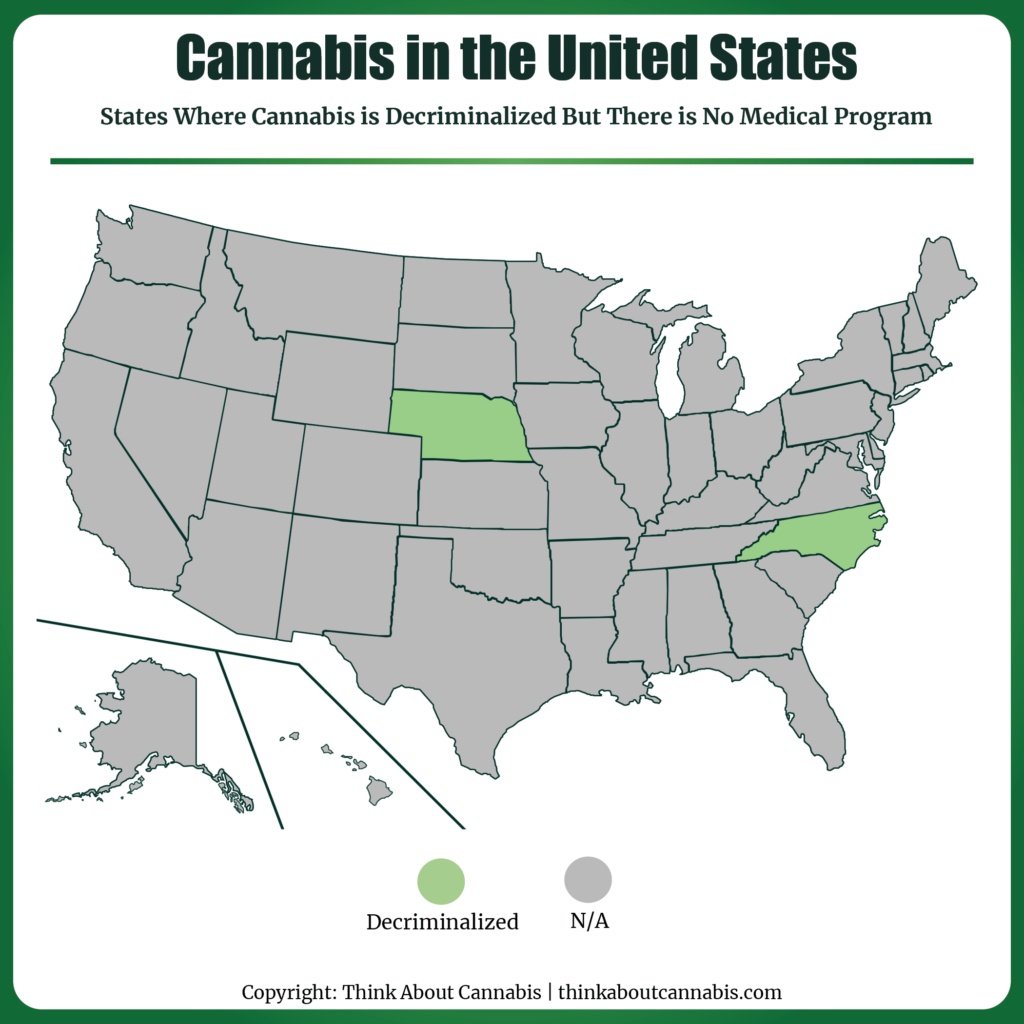
Two states have decriminalized cannabis, yet, they have no medical or adult-use programs in place.
In Nebraska, possession of up to one ounce of cannabis is punishable by a $300 fine. Anything above one ounce is punishable by a fine of at least $500 and jail time.
In North Carolina, possession of up to ½ ounce of cannabis is punishable by a $200 fine. Individuals will not face a felony charge unless they are in possession of at least 1.5 ounces of cannabis.
Key Takeaways: Cannabis is Legal in More Than Half of the United States
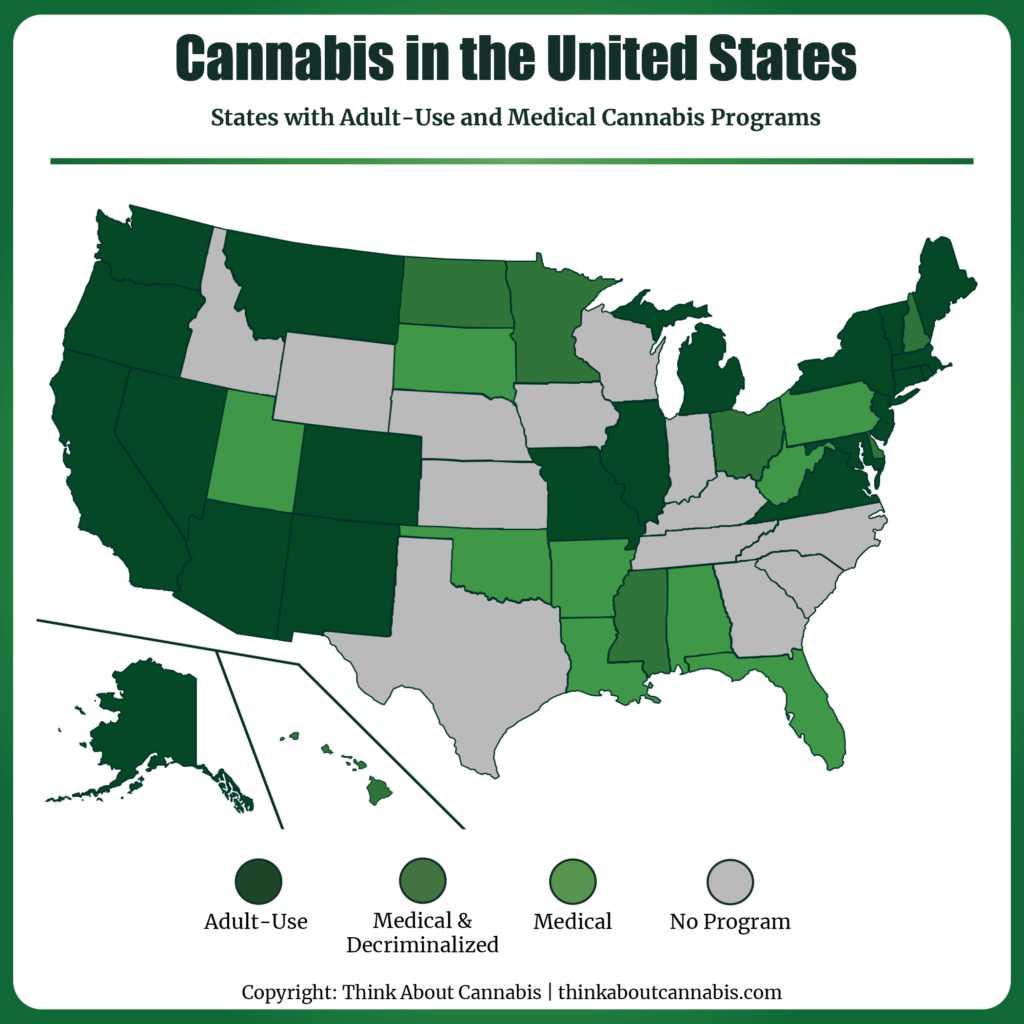
Cannabis use has been legalized in more than half of the United States to varying degrees. As it currently stands, 21 states have legalized adult-use cannabis, whereas 16 states have legalized medical cannabis use.
While cannabis may be legal in your state, it’s worth remembering that each state has its own nuances to its cannabis policies. For example, each medical cannabis state has different qualifying conditions. The amount of cannabis you can possess, even in medical and adult-use states, varies, too.
We will continue to update this article as more states enact cannabis legislation.
References
- NORML. (2022, March 4). Decriminalization. https://norml.org/laws/decriminalization/
- Kubota, S. (2019, August 8). DC will now accept medical marijuana cards from any state. WUSA 9 CBS. https://www.wusa9.com/article/news/dc-will-now-accept-medical-marijuana-cards-from-any-state/65-28ff718e-4868-41b3-8fb9-52dc3a3aab54
- Idaho Office of Drug Policy. (2020, April 2). Cannabidiol. https://odp.idaho.gov/cannibidiol/
- Think About Cannabis. (2022, April 4). What We Know About The 2023 Farm Bill. https://thinkaboutcannabis.com/legislation/what-we-know-about-the-2023-farm-bill
- NORML. (2020, June 23). Nebraska Laws and Penalties. https://norml.org/laws/nebraska-penalties-2/
- FindLaw. (2020, July 15). North Carolina Marijuana Laws. https://www.findlaw.com/state/north-carolina-law/north-carolina-marijuana-laws.html